(完整版)初中状语从句讲解及习题附答案
(英语)中考必备英语状语从句技巧全解及练习题(含答案)
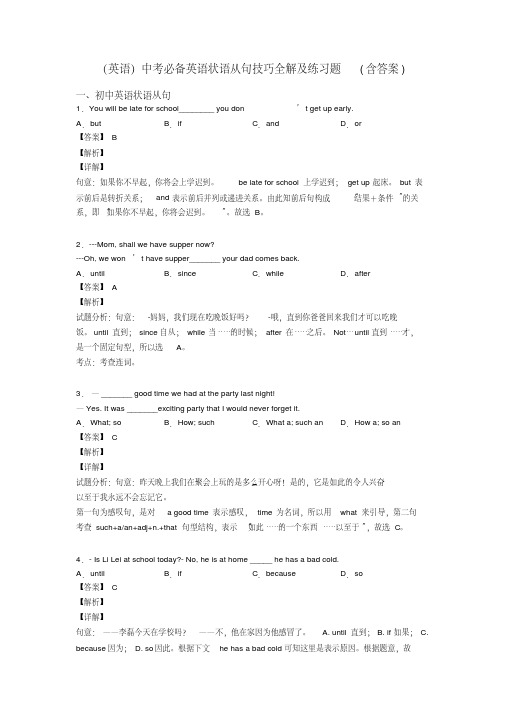
.
A. he had enough time to watch football matches every day
B. he was free enough to go shopping online
C. he had no time to do sports every day 【答案】 C
【解析】
A. as long as 【答案】 A
B. as soon as
C. so that
D. as if
【解析】
【详解】
句意 “-关于朋友,你的观点是什么? -他们像书,只要他们好,我们不需要太多 ”。 A.只要
(引导条件状语从句); B.一 ……就 ……(引导时间状语从句); C.目的是,为的是(引导目
示前后是转折关系; and 表示前后并列或递进关系。由此知前后句构成
“结果+条件 ”的关
系,即 “如果你不早起,你将会迟到。 ”。故选 B。
2.---Mom, shall we have supper now?
---Oh, we won ’ t have supper_______ your dad comes back.
的状语从句); D.好像(引导方式状语从句)。根据句意可知,译为
“只要他们好 ”,引导
条件状语从句,故选 A。
18. -- Can students go online during lessons? -- They can ________ it is for that lesson. A. if B. or C. so D. but 【答案】 A 【解析】句意: ——学生可以在课上上网吗? ——如果是为了上课,他们可以上网。考查 连词辨析题。 if 如果,表条件; or 或者,表选择; so 所以,表结果; but 但是,表转折。 答句是条件状语从句,需用 if 连接。根据句意结构,可知选 A。
状语从句知识点总结及经典习题(含答案)

一I will telephone the police and complain about itthe noise stops soon.
A.unlessB.thoughC.becauseD.if
【答案】A
【解析】
【详解】
句意:----那么你会怎么做?-----我会给警察打电话投诉,除非噪音很快停止。考查连词辨析。A. unless除非,如果不,引导否定的条件状语从句;B. though虽然,尽管,引导让步状语从句;C. because因为,引导原因状语从句;D. if如果,引导条件状语从句。根据句意可知后句表示否定条件,填unless;选A。
【答案】A
【解析】
【详解】
句意:怀特先生告诉我们,如果明天没有达成协议,电话会议将取消。本题是含有if引导的条件状语从句的复合句。在if引导的条件状语从句中,如果从句谈论的是一个有可能发生的事实及其产生的相关的结果,主句用一般将来时态,从句用一般现在时态。选项的位置在if引导的条件状语从句中,要用一般现在时态,B C选项是将来时态不符合题意要排除。D选项是现在完成时态不符合题意要排除。Reach an agreement达成协议固定短语搭配。agreement is reached协议做主语要用被动语态,故选A。
5.—Winter swimming is exciting, but one can’t do it ________ he or she has got some training.
— Exactly! It can be dangerous.
A.afterB.unlessC.ifD.while
状语从句知识点总结及经典习题(含答案)
初中状语从句全面讲解练习题及答案

初中状语从句全面讲解练习题及答案1、基本含义状语修饰动词、形容词、副词或整个句子。
通常由副词、介词短语、动词不定式、分词和从句等担当。
请用下划线划出下列句子中的状语,并说明是什么在做状语:He speaks English very well.He is playing under the tree.I come specially to see you.The boy was praised for his bravery.When she was 12 years old, she began to live in Dalian.If I am not busy tomorrow, I will play football with you.什么是状语从句?用来修饰主句中的动词,副词和形容词的从句叫状语从句。
根据其含义状语从句可分为时间状语从句,地点状语从句,条件状语从句,原因状语从句,结果状语从句,比较状语从句,目的状语从句,让步状语从句。
例句:I will call you as soon as I arrive in Beijing.If he comes back, please let me know.I know how to light a camp fire because I had done it before.2、用法归纳1. 时间状语从句(1)时间状语从句常用when, as, while, before, after, since, till, until, as soon as等连词来引导。
例如:It was raining hard when we got to school yesterday.While he was doing his homework, the telephone rang.As he walked along the lake, he sang happily.He had learned a little Chinese before he came to China.After he finished middle school, he went to work in a factory.(2)在时间状语从句里,通常不用将来时态,用现在时态表示将来的动作或状态。
(完整版)初中状语从句讲解及习题附答案
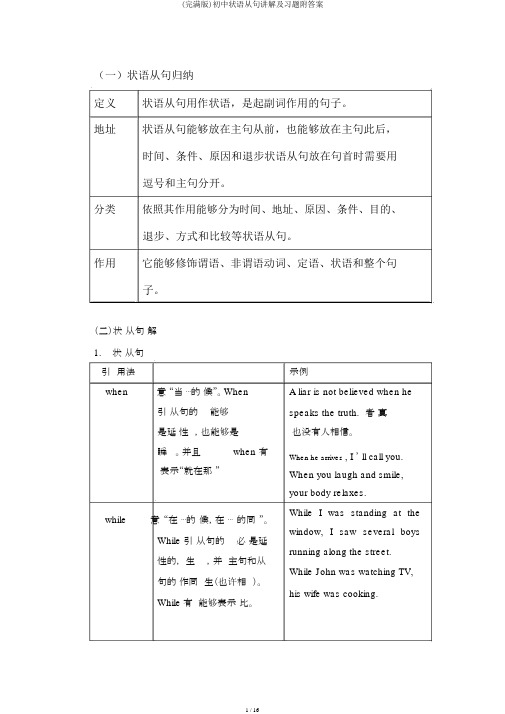
(一)状语从句归纳定义状语从句用作状语,是起副词作用的句子。
地址状语从句能够放在主句从前,也能够放在主句此后,时间、条件、原因和退步状语从句放在句首时需要用逗号和主句分开。
分类依照其作用能够分为时间、地址、原因、条件、目的、退步、方式和比较等状语从句。
作用它能够修饰谓语、非谓语动词、定语、状语和整个句子。
(二)状从句解1.状从句引用法when意“当⋯的候”。
When引从句的能够是延性,也能够是瞬。
并且when 有表示“就在那”while意“在⋯的候,在⋯ 的同”。
While 引从句的必是延性的,生,并主句和从句的作同生(也许相)。
While有能够表示比。
示例A liar is not believed when he speaks the truth.者真也没有人相信。
When he arrives , I’ll call you. When you laugh and smile, your body relaxes.While I was standing at the window, I saw several boys running along the street.While John was watching TV, his wife was cooking.as意“一⋯ 一⋯”。
As 引的作是延性的,生短,一般用于主句和从句作同生; as 也能够一前一后。
after意“在⋯此后”。
表示主句作生在从句作此后。
主句与从句的作关系与before 引的从句相反。
before意“在⋯从前”。
引的从句不用否定形式的,并且当 before 引的从句位于主句此后,有成“就,才”。
当主句用将来,从句是用在;若是 before 引的从句用的是去,主句多用去完成,以便体作的先后。
till意“直到”。
一般情况下能够和 until 互。
若是主句中的是瞬,必用否定形式;若是主句中的是The writer was angry as he was travelling on a train to London because someone had invaded his “ space ”.He smiled as he stood up.With many hungry visitors waiting, don’stay too long at your table after you have finished.If an early exit is necessary, you can leave after a scene is over.You can ’ t watch TV before you finish your homework.Before it ended, the theatrewas almost empty.My father had left for Canada just before the letter arrived.She didn ’event know that it was an earthquake till she saw a shaking ( moving from side to side) light.The fireman worked very hard延性,用必定和否定形式都能够,但表达的意思不相同。
(完整版)初中状语从句全面讲解练习题及标准答案
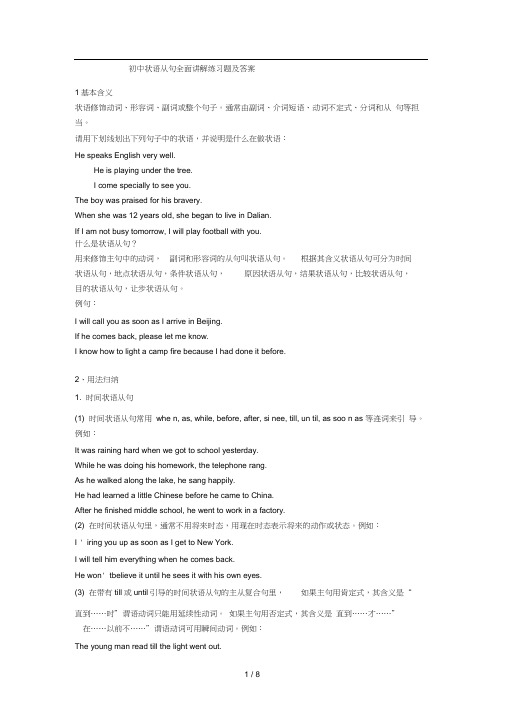
初中状语从句全面讲解练习题及答案1基本含义状语修饰动词、形容词、副词或整个句子。
通常由副词、介词短语、动词不定式、分词和从句等担当。
请用下划线划出下列句子中的状语,并说明是什么在做状语:He speaks English very well.He is playing under the tree.I come specially to see you.The boy was praised for his bravery.When she was 12 years old, she began to live in Dalian.If I am not busy tomorrow, I will play football with you.什么是状语从句?用来修饰主句中的动词,副词和形容词的从句叫状语从句。
根据其含义状语从句可分为时间状语从句,地点状语从句,条件状语从句,原因状语从句,结果状语从句,比较状语从句,目的状语从句,让步状语从句。
例句:I will call you as soon as I arrive in Beijing.If he comes back, please let me know.I know how to light a camp fire because I had done it before.2、用法归纳1. 时间状语从句(1) 时间状语从句常用whe n, as, while, before, after, si nee, till, un til, as soo n as 等连词来引导。
例如:It was raining hard when we got to school yesterday.While he was doing his homework, the telephone rang.As he walked along the lake, he sang happily.He had learned a little Chinese before he came to China.After he finished middle school, he went to work in a factory.(2) 在时间状语从句里,通常不用将来时态,用现在时态表示将来的动作或状态。
初中英语语法状语从句讲解及练习附答案

初中英语语法专题讲座——状语从句状语从句在复合句中作状语,修饰动词、形容词或副词等。
状语从句可以表示时间、条件、原因、地点、目的、结果、让步、方式、比较等意义。
知识梳理:提纲挈领,抓住重点和难点!? 各类状语从句连接词(短语)一览表:时间?when, while, as, as soon as, since, until, after, before,as long as(长达……之久)条件?If, unless,as/so long as(只要)原因?As, because, since,as/so long as(既然,因为)地点?Where目的?So that(为了), in order that结果?So that(方便), so…that, such…that让步?though, although, even if, however方式?As比较than, (not)as…as,时间状语从句:Whenever he comes, he brings a friend. 他每次来都带个朋友。
They all continued their regard for me as long as they lived. 他们毕生都在关心着我.条件状语从句:As long as I am alive, I will go on studying. 只要我活着,我就要学习。
原因状语从句:Since we live near the sea, we enjoy nice weather.由于我们住在海边,能享受到好的天气。
地点状语从句:Put it where we can all see it.把它放在我们都能看到的位置。
目的状语从句:Finish this so that you can start another.把这个做完,(为了)你可以开始另一个。
结果状语从句:He was so angry that he couldn't say a word. 他气得说不出话了。
初中英语状语从句讲解、练习与答案

初中英语状语从句讲解、练习与答案状语从句状语从句用来修饰主句中的动词,副词和形容词的从句叫状语从句。
根据其含义状语从句可分为时间状语从句,地点状语从句,条件状语从句,原因状语从句,结果状语从句,比较状语从句,目的状语从句,让步状语从句。
1. 时间状语从句(1)时间状语从句常用when, as, while, before, after, since, till, until, as soon as等连词来引导。
例如: It was raining hard(rain hard 下大雨) when I got to school yesterday. While he was doing his homework, the telephone rang. As he walked along(沿着走) the lake, he sang happily. He had learned a little Chinese before he came to China. After he finished middle school, he went to work in a factory.(2)在时间状语从句里,通常不用将来时态,用现在时态表示将来的动作或状态。
例如:I’ll ring you up as soon as I get to New York.I will tell him everything when he comes back. He won’t believe it until he sees it with his own eyes.(3)在带有till或until引导的时间状语从句的主从复合句里,如果主句用肯定式,其含义是“一直到……时”,谓语动词只能用延续性动词。
如果主句用否定式,其含义是“直到……才……”, “在……以前不……”, 谓语动词可用瞬间动词。
例如:The young man read till the light went out(熄灭).Let’s wait until the rain stops.We won’t start until Bob comes.Don’t get off(从下来) until the bus stops.【Till是指直到某一特定事件发生的时候,而在那个时刻之后,该事情或状况仍将持续。
(完整版)初中结果状语从句讲解与练习(包含中考题以及答案)
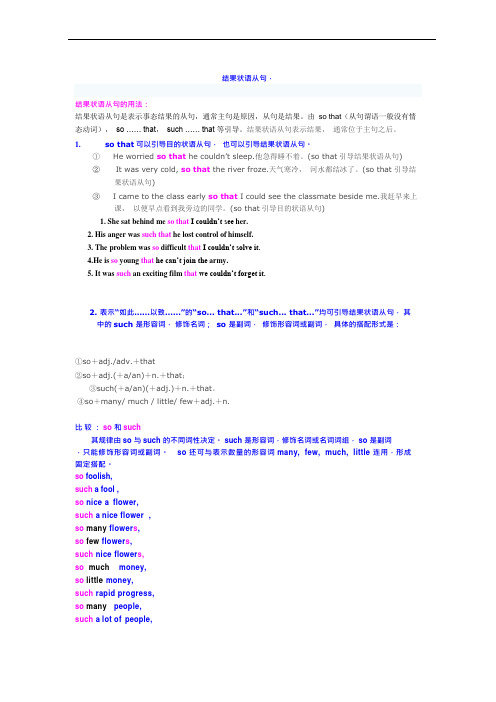
结果状语从句,结果状语从句的用法:结果状语从句是表示事态结果的从句,通常主句是原因,从句是结果。
由so that(从句谓语一般没有情态动词),so …… that,such …… that 等引导。
结果状语从句表示结果,通常位于主句之后。
1.so that 可以引导目的状语从句,也可以引导结果状语从句。
①He worried so that he couldn’t sleep.他急得睡不着。
(so that 引导结果状语从句)②It was very cold, so that the river froze.天气寒冷,河水都结冰了。
(so that 引导结果状语从句)③I came to the class early so that I could see the classmate beside me.我赶早来上课,以便早点看到我旁边的同学。
(so that 引导目的状语从句)1.She sat behind me so that I couldn’t see her.2.His anger was such that he lost control of himself.3.The problem was so difficult that I couldn’t solve it.4.He is so young that he can’t join the army.5. It was such an exciting film that we couldn’t forget it.2. 表示“如此……以致……”的“so... that...”和“such... that...”均可引导结果状语从句,其中的such 是形容词,修饰名词;so 是副词,修饰形容词或副词,具体的搭配形式是:①so+adj./adv.+that②so+adj.(+a/an)+n.+that;③such(+a/an)(+adj.)+n.+that。
(完整版)初中状语从句讲解和练习附答案
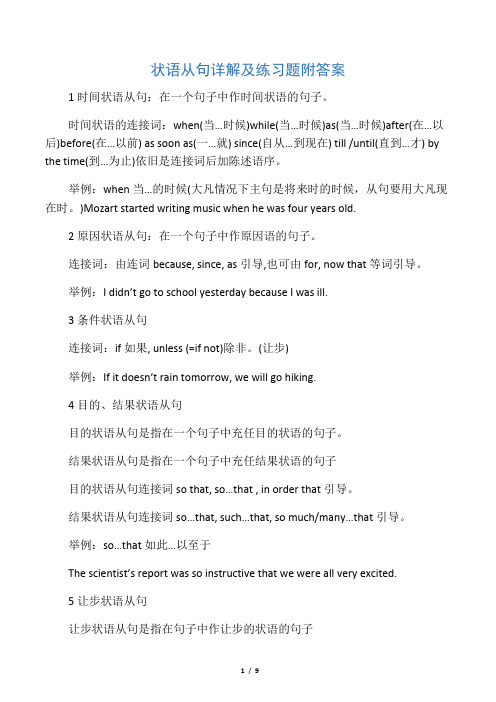
状语从句详解及练习题附答案1时间状语从句:在一个句子中作时间状语的句子。
时间状语的连接词:when(当…时候)while(当…时候)as(当…时候)after(在…以后)before(在…以前) as soon as(一…就) since(自从…到现在) till /until(直到…才) by the time(到…为止)依旧是连接词后加陈述语序。
举例:when当…的时候(大凡情况下主句是将来时的时候,从句要用大凡现在时。
)Mozart started writing music when he was four years old.2原因状语从句:在一个句子中作原因语的句子。
连接词:由连词because, since, as引导,也可由for, now that等词引导。
举例:I didn’t go to school yesterday because I was ill.3条件状语从句连接词:if如果, unless (=if not)除非。
(让步)举例:If it doesn’t rain tomorrow, we will go hiking.4目的、结果状语从句目的状语从句是指在一个句子中充任目的状语的句子。
结果状语从句是指在一个句子中充任结果状语的句子目的状语从句连接词so that, so…that , in order that引导。
结果状语从句连接词so…that, such…that, so much/many…that引导。
举例:so…that如此…以至于The scientist’s report w as so instructive that we were all very excited.5让步状语从句让步状语从句是指在句子中作让步的状语的句子连接词:though, although.,whether…or not举例:Although he is rich, yet he is not happy.状语从句分类1.时间状语从句常用引导词:when, as, while, as soon as, while, before, after, since , till, until分外引导词:theminute,themoment,thesecond,everytime,theday,theinstant,immediately,directly, no sooner … than, hardly …when, scarcely … whenI didn’t realize how special my mother was until I became an adult.While John was watching TV, his wife was cooking.The children ran away from the orchard(果园) the moment they saw the guard.No sooner had I arrived home than it began to rain.Every time I listen to your advice, I get into trouble.2.地点状语从句常用引导词:where分外引导词:wherever, anywhere, everywhereGenerally, air will be heavily polluted where there are factories.Wherever you go, you should work hard.3.原因状语从句常用引导词:because, since, as, since分外引导词:seeing that, now that, in that, considering that, given that, considering that,My friends dislike me because I’m handsome a nd successful.Now that everybody has come, let’s begin our conference.The higher income tax is harmful in that it may discourage people from trying to earn more.Considering that he is no more than 12 years old, his height of 1.80 m is quite remarkable.4.目的状语从句常用引导词:so that, in order that分外引导词:lest, in case, for fear that,in the hope that, for the purpose that, to the end thatThe boss asked the secretary to hurry up with the letters so that he could sign them.The teacher raised his voice on purpose that the students in the back could hear more clearly.5.结果状语从句常用引导词:so … that, so… that, such … that,分外引导词:such that, to the degree that, to the extent that, to such a degree that,He got up so early that he caught the first bus.It’s such a good chance that we must not miss it.To such an degree was he excited that he couldn’t sleep last night.6.条件状语从句常用引导词:if, unless,分外引导词:as/so long as, only if, providing/provided that, suppose that,in case that, on condition thatWe’ll start our project if the president agrees.You will certainly succeed so long as you keep on trying.Provided that there is no opposition, we shall hold the meeting here.7.让步状语从句常用引导词:though, although, even if, even though分外引导词:as(用在让步状语从句中必须要倒装),while (大凡用在句首),no matter …,spite of the fact that, while, whatever, whoever, wherever, whenever, however, whicheverMuch as I respect him, I can’t agree to his proposal.尽管我很尊敬他,我却不同意他的建议。
(完整版)初中英语状语从句归纳附练习及答案.doc
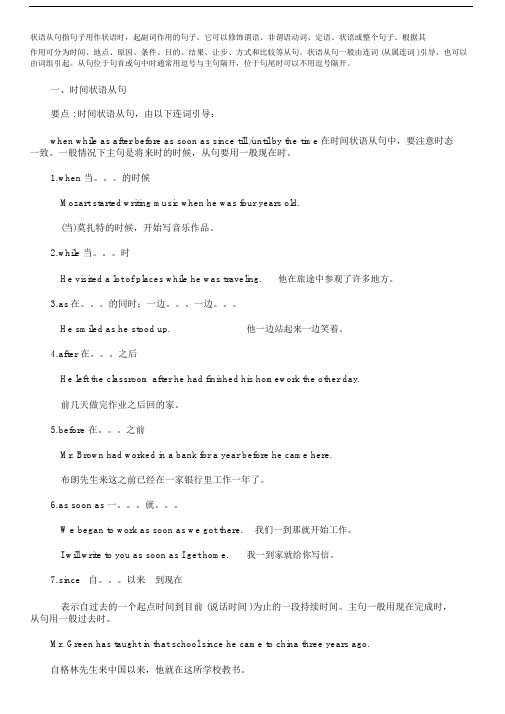
状语从句指句子用作状语时,起副词作用的句子。
它可以修饰谓语、非谓语动词、定语、状语或整个句子。
根据其作用可分为时间、地点、原因、条件、目的、结果、让步、方式和比较等从句。
状语从句一般由连词 (从属连词 )引导,也可以由词组引起。
从句位于句首或句中时通常用逗号与主句隔开,位于句尾时可以不用逗号隔开。
一、时间状语从句要点 : 时间状语从句,由以下连词引导:when while as after before as soon as since till /until by the time在时间状语从句中,要注意时态一致。
一般情况下主句是将来时的时候,从句要用一般现在时。
1.when 当。
的时候Mozart started writing music when he was four years old.(当)莫扎特的时候,开始写音乐作品。
2.while 当。
时He visited a lot of places while he was traveling.他在旅途中参观了许多地方。
3.as在。
的同时;一边。
一边。
He smiled as he stood up.他一边站起来一边笑着。
4.after 在。
之后He left the classroom after he had finished his homework the other day.前几天做完作业之后回的家。
5.before 在。
之前Mr. Brown had worked in a bank for a year before he came here.布朗先生来这之前已经在一家银行里工作一年了。
6.as soon as 一。
就。
We began to work as soon as we got there.我们一到那就开始工作。
I will write to you as soon as I get home.我一到家就给你写信。
(完整版)初中英语状语从句讲解、练习与答案
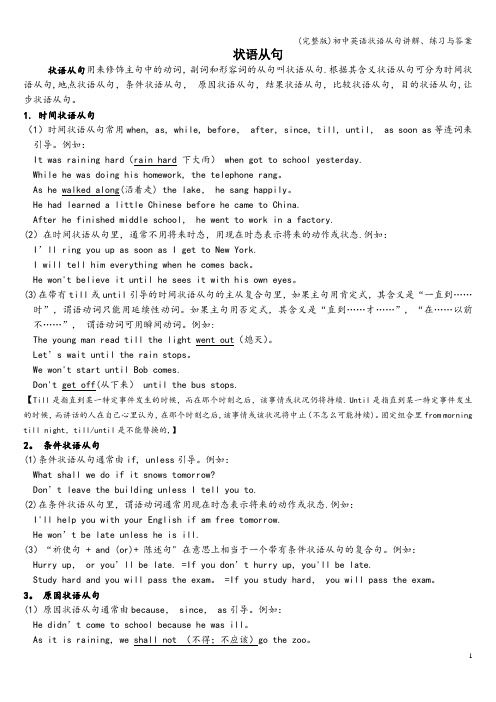
状语从句状语从句用来修饰主句中的动词,副词和形容词的从句叫状语从句.根据其含义状语从句可分为时间状语从句,地点状语从句,条件状语从句,原因状语从句,结果状语从句,比较状语从句,目的状语从句,让步状语从句。
1. 时间状语从句(1)时间状语从句常用when, as, while, before, after, since, till, until, as soon as等连词来引导。
例如:It was raining hard(rain hard 下大雨) when got to school yesterday.While he was doing his homework, the telephone rang。
As he walked along(沿着走) the lake, he sang happily。
He had learned a little Chinese before he came to China.After he finished middle school, he went to work in a factory.(2)在时间状语从句里,通常不用将来时态,用现在时态表示将来的动作或状态.例如:I’ll ring you up as soon as I get to New York.I will tell him everything when he comes back。
He won't believe it until he sees it with his own eyes。
(3)在带有till或until引导的时间状语从句的主从复合句里,如果主句用肯定式,其含义是“一直到……时”,谓语动词只能用延续性动词。
如果主句用否定式,其含义是“直到……才……”, “在……以前不……”,谓语动词可用瞬间动词。
例如:The young man read till the light went out(熄灭)。
初中状语从句讲解及习题附答案

初中状语从句讲解及习题附答案(⼀)状语从句概述(⼆)状语从句详解1、时间状语从句2、地点状语从句3、条件状语从句4、原因状语从句5、⽬得状语从句6、结果状语从句8、⽐较状语从句9、⽅式状语从句练习⼀B、SinceC、ForD、So2、---Do you know if he _______ to play basketball with us?---I think he will e if he ______ free tomorrow、A、es; isB、es; will beC、will e; isD、will e; will be3、In the zoo if a child _____ into the water and can’t swim, the dolphins maye up ______ him、A、will fall; to helpB、falls; to helpC、will fall; helpD、falls; helping4、I don’t rememb er ________ he worked in that city when he was young、A、whatB、whichC、whereD、who5、We will stay at home if my aunt ________ to visit us tomorrow、A、esB、eC、will eD、is ing6、The police asked the children _______ cross the street ________ the traffic lights turned green、A、not; beforeB、don’t; whenC、not to; untilD、not; after7、I was late for class yesterday _______ there was something wrong with my bike、A、when8、I’ll go swimming with you if I ________ free tomorrow、A、will beB、shall beC、amD、was9、In the exam, the ________ you are, ______ the _______ mistakes you will make、A、careful; littleB、more careful; fewestC、more careful; fewerD、more careful; less10、You should finish your lessons _______ you go out to play、A、beforeB、afterC、whenD、while11、I hurried _____ I wouldn’t be late for class、A、sinceB、so thatC、as ifD、unless12、When you read the book, you’d better make a mark _______ you h ave any questions、A、whichB、thatC、whereD、though13、The teacher raised his voice _______ all the students could hear him、A、forB、so thatC、becauseD、in order14、He took off his coat _______ he felt hot、A、becauseD、since15、It is ______ that we’d like to go out for a walk、A、a lovely dayB、too lovely a dayC、so lovely a dayD、such lovely a day16、Mary had ______ much work to do that she stayed at her office all day、A、suchB、soC、tooD、very17、_______ I felt very tired, I tried to finish the work、A、AlthoughB、BecauseC、AsD、As if18、______ the day went on, the weather got worse、A、WithB、SinceC、WhileD、As19、______ well you can drive, you must drive carefully、A、So long asB、In order thatC、No matter howD、The moment20、Write to me as soon as you ________ to Beijing、A、will getB、getC、gettingD、got⼆、根据中⽂意思完成下列英语句⼦1、不管她跟我开什么玩笑,我都不⽣⽓。
初中状语从句全面讲解练习题及标准答案
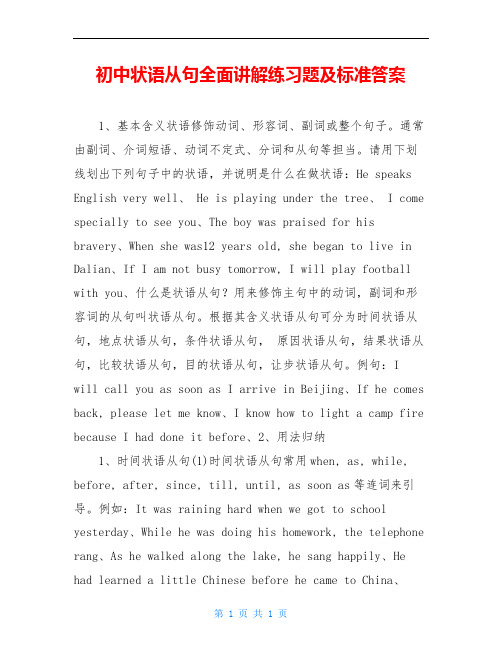
初中状语从句全面讲解练习题及标准答案1、基本含义状语修饰动词、形容词、副词或整个句子。
通常由副词、介词短语、动词不定式、分词和从句等担当。
请用下划线划出下列句子中的状语,并说明是什么在做状语:He speaks English very well、 He is playing under the tree、 I come specially to see you、The boy was praised for his bravery、When she was12 years old, she began to live in Dalian、If I am not busy tomorrow, I will play football with you、什么是状语从句?用来修饰主句中的动词,副词和形容词的从句叫状语从句。
根据其含义状语从句可分为时间状语从句,地点状语从句,条件状语从句,原因状语从句,结果状语从句,比较状语从句,目的状语从句,让步状语从句。
例句:Iwill call you as soon as I arrive in Beijing、If he comes back, please let me know、I know how to light a camp fire because I had done it before、2、用法归纳1、时间状语从句(1)时间状语从句常用when, as, while, before, after, since, till, until, as soon as等连词来引导。
例如:It was raining hard when we got to school yesterday、While he was doing his homework, the telephone rang、As he walked along the lake, he sang happily、He had learned a little Chinese before he came to China、After he finished middle school, he went to work in a factory、(2)在时间状语从句里,通常不用将来时态,用现在时态表示将来的动作或状态。
初中英语状语从句讲解、练习与答案

状语从句状语从句用来修饰主句中的动词,副词和形容词的从句叫状语从句。
根据其含义状语从句可分为时间状语从句,地点状语从句,条件状语从句,原因状语从句,结果状语从句,比较状语从句,目的状语从句,让步状语从句。
1. 时间状语从句(1)时间状语从句常用when, as, while, before, after, since, till, until, as soon as等连词来引导。
例如:It was raining hard(rain hard 下大雨)when got to school yesterday.While he was doing his homework, the telephone rang.As he walked along(沿着走)the lake, he sang happily.He had learned a little Chinese before he came to China.After he finished middle school, he went to work in a factory.(2)在时间状语从句里,通常不用将来时态,用现在时态表示将来的动作或状态。
例如:I’ll ring you up as soon as I get to New York.I will tell him everything when he comes back.He won’t believe it until he sees it with his own eyes.(3)在带有till或until引导的时间状语从句的主从复合句里,如果主句用肯定式,其含义是“一直到……时”,谓语动词只能用延续性动词。
如果主句用否定式,其含义是“直到……才……”, “在……以前不……”, 谓语动词可用瞬间动词。
例如:The young man read till the light went out(熄灭).Let’s wait until the rain stops.We won’t start until Bob comes.Don’t get off(从下来)until the bus stops.【Till是指直到某一特定事件发生的时候,而在那个时刻之后,该事情或状况仍将持续。
初中状语从句讲解和习题附答案解析
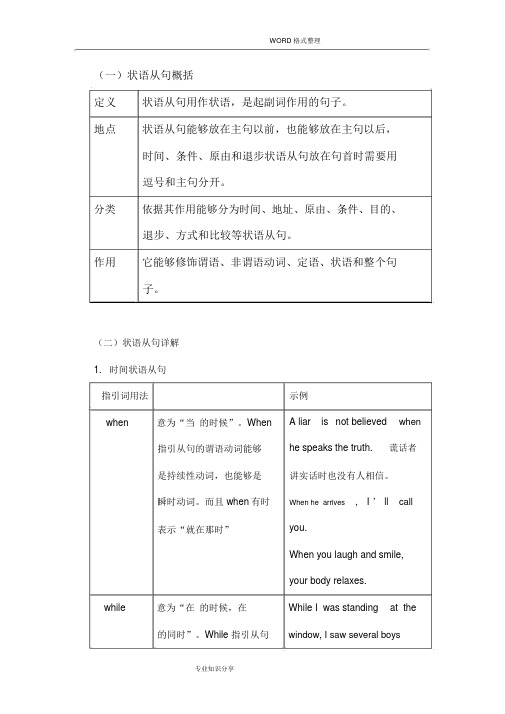
(一)状语从句概括定义状语从句用作状语,是起副词作用的句子。
地点状语从句能够放在主句以前,也能够放在主句以后,时间、条件、原由和退步状语从句放在句首时需要用逗号和主句分开。
分类依据其作用能够分为时间、地址、原由、条件、目的、退步、方式和比较等状语从句。
作用它能够修饰谓语、非谓语动词、定语、状语和整个句子。
(二)状语从句详解1.时间状语从句指引词用法when意为“当的时候”。
When指引从句的谓语动词能够是持续性动词,也能够是瞬时动词。
而且 when有时表示“就在那时”示例A liar is not believed when he speaks the truth.谎话者讲实话时也没有人相信。
When he arrives, I ’ ll call you.When you laugh and smile, your body relaxes.while意为“在的时候,在While I was standing at the 的同时”。
While 指引从句window, I saw several boys的谓语动词一定是持续性running along the street.的,发生时间较长,并强While John was watching TV,调主句和从句的动作同时his wife was cooking.发生(或许相对应)。
While有时还能够表示对照。
as 意为“一边一边”。
As The writer was angry as he 指引的动作是持续性的,was travelling on a train to发生时间较短,一般用于London because someone had主句和从句动作同时发invaded his “space”.生;as 也能够重申一前一He smiled as he stood up.后。
after 意为“在以后”。
表示主With many hungry visitors 句动作发生在从句动作之waiting, don’t stay too后。
(word)初中状语从句讲解和习题附答案解析

WORD格式整理〔一〕状语从句概述定义状语从句用作状语,是起副词作用的句子。
位置状语从句可以放在主句之前,也可以放在主句之后,时间、条件、原因和让步状语从句放在句首时需要用逗号和主句隔开。
分类根据其作用可以分为时间、地点、原因、条件、目的、让步、方式和比较等状语从句。
作用它可以修饰谓语、非谓语动词、定语、状语和整个句子。
〔二〕状语从句详解时间状语从句引导词用法when 意为“当的时候〞。
When引导从句的谓语动词可以是延续性动词,也可以是瞬间动词。
并且when有时表示“就在那时〞例如Aliar is notbelieved when hespeaksthetruth.说谎者讲真话时也没有人相信。
Whenhearrives, I’ll call you. Whenyoulaughandsmile, yourbodyrelaxes.while意为“在的时候,在WhileIwasstanding atthe的同时〞。
While引导从句window,Isawseveralboys专业知识分享的谓语动词必须是延续性runningalongthestreet.的,发生时间较长,并强WhileJohnwaswatching TV,调主句和从句的动作同时hiswifewascooking.发生〔或者相对应〕。
While有时还可以表示比照。
as意为“一边一边〞。
As Thewriterwasangryashe引导的动作是延续性的,wastravelling onatrain to发生时间较短,一般用于Londonbecausesomeonehad主句和从句动作同时发invadedhis“space〞.生;as也可以强调一前一Hesmiledashestoodup.后。
after意为“在之后〞。
表示主Withmanyhungryvisitors 句动作发生在从句动作之waiting,don’t stay too后。
- 1、下载文档前请自行甄别文档内容的完整性,平台不提供额外的编辑、内容补充、找答案等附加服务。
- 2、"仅部分预览"的文档,不可在线预览部分如存在完整性等问题,可反馈申请退款(可完整预览的文档不适用该条件!)。
- 3、如文档侵犯您的权益,请联系客服反馈,我们会尽快为您处理(人工客服工作时间:9:00-18:30)。
(一)状语从句概述(二)状语从句详解1. 时间状语从句2.地点状语从句3.条件状语从句4.原因状语从句5.目的状语从句6.结果状语从句7.让步状语从句8. 比较状语从句9.方式状语从句练习一一. 单项填空1. _______ he’s old, he can still carry this heavy bag.A. ThoughB. SinceC. ForD. So2. ---Do you know if he _______ to play basketball with us?---I think he will come if he ______ free tomorrow.A. comes; isB. comes; will beC. will come; isD. will come; will be3. In the zoo if a child _____ into the water and can’t swim, the dolphins may come up ______ him.A. will fall; to helpB. falls; to helpC. will fall; helpD. falls; helping4. I don’t remember ________ he worked in that city when he was young.A. whatB. whichC. whereD. who5. We will stay at home if my aunt ________ to visit us tomorrow.A. comesB. comeC. will comeD. is coming6. The police asked the children _______ cross the street ________ the traffic lights turned green.A. not; beforeB. don’t; whenC. not to; untilD. not; after7. I was late for class yesterday _______ there was something wrong with my bike.A. whenB. thatC. untilD. because8. I’ll go swimming with you if I ________ free tomorrow.A. will beB. shall beC. amD. was9. In the exam, the ________ you are, ______ the _______ mistakes you will make.A. careful; littleB. more careful; fewestC. more careful; fewerD. more careful; less10. You should finish your lessons _______ you go out to play.A. beforeB. afterC. whenD. while11. I hurried _____ I wouldn’t be late for class.A. sinceB. so thatC. as ifD. unless12. When you read the book, you’d better make a mark _______ you have any questions.A. whichB. thatC. whereD. though13. The teacher raised his voice _______ all the students could hear him.A. forB. so thatC. becauseD. in order14. He took off his coat _______ he felt hot.A. becauseB. asC. ifD. since15. It is ______ that we’d like to go out for a walk.A. a lovely dayB. too lovely a dayC. so lovely a dayD. such lovely a day16. Mary had ______ much work to do that she stayed at her office all day.A. suchB. soC. tooD. very17. _______ I felt very tired, I tried to finish the work.A. AlthoughB. BecauseC. AsD. As if18. ______ the day went on, the weather got worse.A. WithB. SinceC. WhileD. As19. ______ well you can drive, you must drive carefully.A. So long asB. In order thatC. No matter howD. The moment20. Write to me as soon as you ________ to Beijing.A. will getB. getC. gettingD. got二. 根据中文意思完成下列英语句子1. 不管他跟我开什么玩笑,我都不生气。
I am not angry with him, _______ _______ ______ jokes he ______ on me.2. 布鲁斯太太对学生非常亲切,以至于学生把她当做母亲。
Mrs Bruce was _______ kind to her students ______ they ______ her _____ their mother.3. 只要我们竭尽全力,父母就会满意我们的表现。
Our parents will be pleased with our performance _____ _____ ______ we try our best.4. 你一到上海就给我打个电话好吗?Will you please call me ______ ______ ______ you get to Shanghai.5. 这个七岁的女孩酷爱钢琴,以至于他已经坚持练习两年了。
The seven-year-old girl likes playing the piano ______ ______ ______ she has kept practicing for two years.6. 虽然她很忙,他还坚持自学英语。
_______ _______ ______ _______, she kept on learning English by herself.7. 他长大后相当一名记者。
He wants to be a journalist ______ _______ _______ _______.8. 无论刮风下雨,我们的老师总是第一个到校。
_______ _______ windy or rainy, our teacher is always the first to get to school.9. 如果人人为保护环境做出贡献,世界将会变得更美好。
______ ______ ______ _____ _______ to protecting the environment, the world will become much more beautiful.10. 李明昨天没来上学,因为他病了。
Li Ming didn’t come to school _______ _______ ______ ______.练习二1. The meeting didn't start___ everyone was there.A. becauseB. untilC. whyD. if2 .The boy ___ to bed ___ his mother came in.A. went not; untilB. didn't go; afterC. went; untilD. didn't go; until3. I won't believe you___ I have seen it with my own eyes.A. beforeB. untilC. afterD. when4 .He ___ home ___ she was satisfied ___ his answer yesterday.A. didn't go; until; withB. wasn't go; after; toC. doesn't go; before; withD. didn't go; until; to5 .He ___ back until the work ___ done.A. isn't; will beB. isn't; isC. won't be; will beD. won't be; is6 .They didn't start the work ___ their teacher came back.A. untilB. whileC. as soon asD. if7. Tom will call me as soon as he ___ Shanghai.A. arrivesB. will reachC. arrives inD. get to8. I'm sure he'll come to see me before he ___ Beijing.A. will leaveB. is leavingC. leaveD. leaves9. I will tell him the news as soon as he___ back.A. comeB. comesC. will comeD. came10. Tom has got a watch. He ___ it for two years. It _______ by his father.A. has bought; was boughtB. has got; is bought ,C. was bought; has bought .D. has had; was bought "'11. When he got to the station, the train ___.A. leftB. had leftC. leavesD. has left12. The boy told his father what he ___ in the street.A. sawB. have seenC. had seenD. see13.We ___ TV when the telephone ____.A. watched; was ringingB. were watching; rangC. watch; ringsD. are watching; rang14.By the end of last term, I___ ten books.A. had finished readingB. have finish readingC. had finish to readD. finish read15. I ___ you for a long time. Where ___ you ___?A. didn't see; did; goB. didn't see; have; goneC. haven't seen; have; beenD. haven't seen; have; gone16. Tom___ China for 3 years.A. has beenB. has been inC. has been toD. has been at17. I won't go to see the film tonight, because I ___ my ticket.A. lostB. have lostC. will loseD. didn't lose18.-Hello! May I speak to Bob?-Sorry, but he ___ for a month.A. had been awayB. was leftC. leftD. has been away19. I ___ him since I began to live in the city.A. knowB. have knownC. knewD. will know20.Zhao Lan ___ already ___ in this school for two years.A. was; studyingB. will; studyC. has; studiedD. are; studying21.Betty didn't go to see the film yesterday ___ she was ill.A. becauseB. butC. untilD. if22 May I sit nearer___I can see more clearly?A. as ifB. so thatC. even ifD. so23. ___ you work hard, you will certainly succeed.A. ThoughB. IfC. BecauseD. For24. ___ he came to study in the university, he has made much progress in the study of English.A. WhileB. WhenC. SinceD. After25. I'd like to go swimming _____ the water is not too cold.A. forB. unlessC. ifD. whether26. There are ___ many league members in class 2 ___ in Class 4.A. both; andB. 'so; thatC. either; orD. as; as27. -Do you have a big library?-No, we don't. At least, not___yours.A. as big asB. as big thanC. as bigger thanD. bigger as28. Suzhou is not ____ beautiful ____ Hangzhou.A. as; thanB. so; asC. even; thanD. /; than29. Iron is more useful ___ any other metal.A. asB. thanC. thenD. so30. I want to know ___ she is going to see a film.A. ifB. thatC. whatD. which31. You are sure to pass the exam ___ you study hard.A. ifB. thoughC. thatD. since32. I'll go to see the film with you___I have time this evening.A. whetherB. soC. ifD. when33. ___ you study harder, you'll never pass the final exam.A. IfB. UntilC. UnlessD. Except34. Although it was raining, still worked in the fields.A. but theyB. and theyC. theyD. and yet they35 .___ there were only five soldiers left at the front, ___ they went on fighting.A. Because; soB. If; andC. Though; butD. Though; /36. ___ she is very old, ___ she can still work eight hours a day.A. Because; soB. Though; butC. As; yetD. Though; yet37. Please answer the question in a loud enough voice ___ all the class may hear.A. so, thatB. orC. in order thatD. and38. Lift it up___I may see it.A. thoughB. so thatC. asD. than39. I hurried___I wouldn't be late for class.A. soB. so thatC. ifD. unless40. We should go by bus ___ we can get there earlier.A. as soon asB. whereC. in order thatD. as41. The dictionary is so expensive ___ I can't buy it.A. becauseB. whenC. thatD. if42. I got there ___ late ___ I didn't see him.A. too; toB. such; thatC. so; thatD. so; as43. It is ___ hot in the room ___ we have to go out for a walk.A. such; thatB. so; thatC. as; asD. such; as44 He has___ an interesting book that we want to read it.A. soB. suchC. the sameD. as练习一答案一. 1.A 2.C 3.B 4.C 5.A 6.C 7.D 8.C 9.C 10.A11.B 12.C 13.B 14.A 15.C 16.B 17.A 18.D 19.C 20.B二. 1. no matter what; plays 2.so; that; regarded; as 3. as long as4. as long as5. so much that6. Though she was busy7. when he growsup8.Whether it’s 9. If everyone makes a contribution 10. because he wasill练习二参考答案:1-5B D B A D 6-10 A C D B D 11-15 B C B AC 16-20B B D B C 21-25A B B C C26-30 D A B B A 31-35 A C C C D 36-40 D C B B C 41-44 C C B B。
